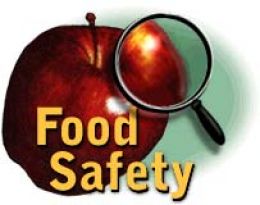 In recent years I have noticed the increased frequency of incidents and reports describing contaminated food items or food-borne illness outbreaks. Just in the last 18 to 24 months or so I can remember a few of them off the top of my head, such as green onions contaminated with E Coli at Taco Bell’s across the northeast, salmonella tainted tomatoes from Florida and Mexico, spinach recalled due to E Coli, baby formula from China contaminated with melamine. Today I read about dioxins found in pigs in Ireland and now they are being culled from the food supply chain.
In recent years I have noticed the increased frequency of incidents and reports describing contaminated food items or food-borne illness outbreaks. Just in the last 18 to 24 months or so I can remember a few of them off the top of my head, such as green onions contaminated with E Coli at Taco Bell’s across the northeast, salmonella tainted tomatoes from Florida and Mexico, spinach recalled due to E Coli, baby formula from China contaminated with melamine. Today I read about dioxins found in pigs in Ireland and now they are being culled from the food supply chain.
In the restaurant business Food Service Sanitation is one of those “must have” courses that also includes a certification exam to ensure students are able to understand all the facets of food-borne illness and how to prevent it from happening. In the restaurant industry most local or county governments require establishments to post and prominently display their most recent inspection rating. In our area most of the places seem to be in the 90-100 range, with a few in the low 90’s and very few if any at the 100 rating. When we go to restaurants now one of the first things that Ben looks for is the food safety sanitation inspection rating, and knowing it is in the 90’s makes you feel like it should be safe to eat their food, but you never really know what the restaurant got marks off and have to wonder some.
Have you ever opened up a food item that you purchased at the grocery only to find that it has spoiled or is rotten before the expiration date? Or have you gotten home from the grocery and noticed that the dairy product is past the expiration date because you forgot to check the date? Typically I am really good about checking the expiration or “Use By” dates on packaging and a few weeks ago I remember some yogurts were over a week out of date and they were still on sale in the dairy case! Amazing that these items were not culled and pulled from the shelves. I know that most cultured dairy products are okay a few days past expiration, but more than 10 days is really pushing it.
Or have you opened up a frozen item days later your purchase and noticed that the product appears to have been thawed and re-frozen? This indicates that the item was stored out of refrigeration long enough and then re-frozen, also indicating a lack of proper shipping. Products like this create a high risk food item, and needs to be returned. I have also noticed lately at the grocery that fresh strawberries seem to go bad sooner than before. I will buy a container of them and within less than a week they start to mold and deteriorate. This indicates to me that the strawberries were shipped and held out of refrigeration for extended periods, or there is some inventory overstocking and they are not selling fast enough.
How concerned are you about the state of our food supply? Do you think that sanitation requirements and regulations set by the FDA, USDA and local government health and safety organizations for restaurants, food processors and food suppliers is strong enough? How much control do we really have in knowing that our food supply chain is going to be safe? Many questions to ponder and discuss.












8 responses so far ↓
1 LDGourmet // Dec 8, 2008 at 3:39 pm
Food safety, the safety of our “foodshed” is increasingly scary. Between melamine in Chinese foods (do I have to worry about all the tea I drink? if not melamine, what else are they allowing the food to be tainted by?)
or the Irish pork now…just seems we need to be closer to our food sources and demand transparency from our FDA/USDA screeners. Instead of allowing frankenfoods, why don’t they inspect more of the foods coming into our food supplies and get off the backs of our small farmers and producers here?
Okay, ’nuff ranting…
2 gregb // Dec 8, 2008 at 3:47 pm
Our area has online restaurant inspection reports, so we can view them whenever we consider visiting a restaurant.
I am concerned about the food supply. So much so that I have a garden plot out back to grow my own vegetables. They taste better and I don’t have to worry about what the Chinese put into them.
3 BeFoodie // Dec 8, 2008 at 7:05 pm
I guess I’m a bit away from this topic as we have mostly our own products in Turkey. However because of some international politics issues agricultre is under risk of foreign attack here, too. Our main problem is how much the seeds are changed/rotten in dnas. As organic products are much more expensive than any other products it’s inevitable to use products grown with ‘too much’ hormons.
Although such problems I guess we’re still lucky to living in Turkey as we mostly have our own fresh products. Also we do not use Chinese products of food here. Not much I guess. Tea is an exception, and I’m not sure if they can add any melamine or any other things to tea. (And as I know scented/flavoured teas are mostly proceeded in Europe or in the States.)
I jumped from topic to topic. To sum up I can say that we should mostly use daily/fresh products and mostly from local producers if possible.
Human of earlier era was in balance with nature. They were following the specialities of the seasons. In my opinion we’d rather sign a peace agreement with nature, and listen to it. The start of the global economical crisis is also another signal of the mistakes we’ve been doing towards nature and history.
4 BeFoodie // Dec 8, 2008 at 7:16 pm
I forgot to add. Food is a very important item of political tricks which gets you confused. You sometimes can’t decide who to trust.
As in the melamine issue of China, here was another topic about coca-cola drinks which are sent to Turkey. Some organizations say that Coca Cola is using a kind of cheaper sweetener which causes brain damage and illnesses in colas they send to Turkey.
This can be a political saying or a scientific truth. They show you scientific proof of their argument however I cannot really know who tells the real truth as an individual.
If we go back to first comment of mine as food is the most important part of our lives it’s better to chose products which we know better, which we can control easier… means which is local 🙂 (as much as possible)
5 BeFoodie // Dec 8, 2008 at 7:27 pm
Ohh I didn’t know that I had that much to say about it lol another thing about chosing the local.
Human dna is same in human-being as species. However every member of different geographic area has his own genetic codes.
There was an article about this in Geo. They simply say this : eat what your ancestors were eating. For example if you are a native of America eat what Americans have been eating (or were eating) there for ages. Or if you’re a Nordic, eat what your ancestors were eating along the ages. Because nature gives you what you really need to have to live right “there… where you live”.
Of course there is nothing wrong to eat healthy products of any part of the world. Variety of nature is endlessly on use of human. But here then the second ‘must’ comes: Just have the ones natural and fresh. The thing which you feed your body must be a product of nature not industrial…
6 Claire // Nov 16, 2009 at 3:20 am
Have you seen the movie “Food Inc.”? It is eye opening! It makes you realize the monopoly of the food industry. Since seeing that movie, I’ve pushed towards buying only organic and local produce/products as often as possible.
7 Ryan Boudreaux // Nov 16, 2009 at 10:42 am
Clarie, I do wish to see “Food, Inc.” however it never played near us, I may have to purchase or rent the DVD when it becomes available. I saw trailers for it and visited their website often when I heard about it’s release a few months ago. Thank you for bringing it back into the forefront of my memory.
8 OvenAversion // Jan 5, 2010 at 11:08 pm
I definitely think there should be better regulation and routine checks that establishments are honoring the requirements. I have bought expired headache medicine once by accident (which was shocking considering the expiration dates are usually at LEAST a year out!) and caught expired yogurt in the refrigerated case. I walked all over the store to find somebody to inform about it, and he looked at me like I was crazy! Obviously I didn’t buy it, but I thought they should remove it from the shelves to prevent anyone else from getting it.
I think this also brings to light the need to consider further labeling. Maybe meat packages should clearly state all the different countries from where it came. Just a start on one of the more dangerous items in our food chain.